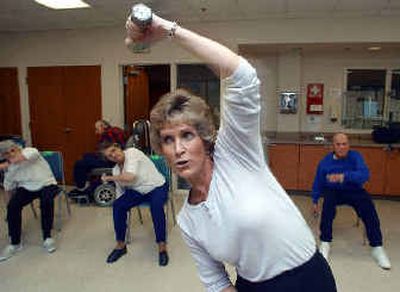Preferred seating

When Teresa Reymann, the hyper-enthusiastic wellness manager at Charlestown Retirement Community in Catonsville, Md., says “take a seat,” don’t count on getting much rest.
Reymann conducts a chair aerobics class every Tuesday and Thursday afternoon at the upscale senior-citizen complex. In her mind, a chair isn’t really a chair. It’s an underutilized fitness prop.
“If we do some side kicks,” Reymann announces at the start of a recent session, “make sure you have enough room between the person next to you.”
Fifteen people are seated in a semicircle in front of her. Most are familiar with Reymann’s move-it-or-lose-it philosophy of good health, which she has translated into a loosely choreographed routine that makes use of light dumbbells, elastic resistance bands and kickboxing moves.
“Give me a straight punch,” Reymann says as the group unleashes a flurry of rusty right and left jabs. “Keep that elbow soft. I don’t want that joint to snap at the end.”
Charlestown is one of 27 campus-like facilities owned and operated by Maryland-based Erickson Retirement Communities. The company emphasizes preventive medicine, offering residents on-site programs that range from meditation to tai chi to chair aerobics.
Physical limitations usually aren’t as daunting as they might seem, says Dr. Matt Narrett, Erickson’s regional medical director.
“Remarkably enough,” he adds, “it’s the most frail individuals who benefit the most from exercise. Because they have the most to gain, it’s relatively easy to show the benefits of that improvement. Don’t assume because you’re frail you’re too weak to do some form of exercise.”
Before joining the staff at Charlestown, Reymann – who grew up just a few miles away and was a basketball star in high school – spent 14 years as a fitness instructor in conventional health clubs.
Her current clients might not be as buff as her former ones, but she says they’re more appreciative and more fun to be around. The only special attention they require involves accommodating medical conditions that can run the gamut from artificial hips to multiple sclerosis.
Reymann, 42, makes a point of tailoring movements to different ability levels; for example, demonstrating low, medium and high leg kicks that can all do the job of elevating a heart rate.
Turning her attention to the abdominals, she tells those folks who are popping out of their chairs trying to perform double-knee raises to ease up: It’s OK to lift only one knee at a time.
“Pretend there’s a $100 bill between the butt cheeks. Don’t let it fall out,” Reymann barks as the class stands up and marches in place, arms still pumping. She’s a stickler for proper posture.
The class moves on to throwing imaginary punches while holding 1- or 2-pound dumbbells. They chop imaginary wood to target the shoulder and back muscles, then do some leg lunges, performed either standing up or half-seated on the edge of their chair.
Meanwhile, the mood music is tripping down memory lane, having switched from thumping disco to the brassy, Broadway bleat of “Hello, Dolly.” Everyone is bent at the waist doing dumbbell rows, otherwise known as the “weed pull” exercise.
“Your balance is much better. Two weeks ago you were all over the place,” Reymann says to Jane Prince.
Prince, a vigorous “83 and a half (years old),” as she says, started chair aerobics more than three months ago in search of what she calls “some upper body muscles.” She found them. She also has gotten rid of the pain in her achy back.
“I very much want to stay independent,” Prince says. “I will do anything to improve my health.”
Milt Levitt, 73, knows his health probably isn’t going to get better, but maybe his balance will improve.
“I have Parkinson’s,” he explains, “and my claim to fame is I fall a lot.”
Levitt spends most of his waking time in a wheelchair. That doesn’t stop him from attending Reymann’s aerobics class and marveling at the instructor’s energy.
“Teresa’s a whiz,” he says.
Levitt’s left hook couldn’t break an egg. And he can barely lift his right arm anymore. Nonetheless, he rolls his wheelchair into the room every Tuesday and Thursday and puts up his dukes.
You don’t always need a knockout punch to be a great fighter.